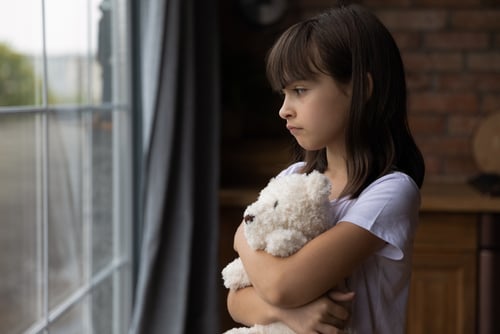Developmental trauma is a term used to describe the type of trauma that happens to a person during childhood. This is a vulnerable period of emotional, cognitive, and social development. Children don’t have the ability to process and understand events the same way adults do, so any negative experiences, particularly severe ones like any type of abuse or neglect, remain deeply rooted in a child’s emotional and psychological framework.
If children are continuously overwhelmed by negative emotions they’re not equipped to understand and handle, like all human beings, they find a way of adapting to environmental circumstances and developing their survival mode emotional responses. However, they lack the tools to do so constructively and rationally, leaving them with coping mechanisms that can, in some cases, be highly damaging to their sense of self, other people, and the world as a whole.
Individuals who experienced profoundly harmful events as children (physical, emotional, sexual abuse, neglect, abandonment) may grow up to view these patterns of behavior as usual and use a set of complex and frequently maladaptive defense mechanisms to cope with their emotions and life in general. Unfortunately, relationships with others suffer the consequences of these coping mechanisms because the affected individuals might be unable to recognize and change those behaviors even when they’re safe, and there’s no objective threat.
Can Developmental Traumas Affect Adult Relationships?
When left unidentified and unaddressed, developmental traumas can affect every aspect of a person’s life. Aside from one’s self-image and the general view of the world and people around them, this type of trauma can impact all adult relationships, professional and private ones. Since emotional bonds are something we adopt very early in life, if the recovery from childhood trauma never occurs, the feelings of mistrust and danger can carry over to relationships with coworkers, friends, family, and romantic partners.
The most intimate relationships naturally make us particularly vulnerable and susceptible to the influence of unresolved traumatic experiences. This type of relationship generally carries the high potential of bringing all our insecurities to the surface, which is, to a certain degree, to be expected. Loving someone makes us vulnerable by default. However, when we add the consequences of developmental trauma into the emotional whirlwind of a romantic relationship, things can get far more complicated and sometimes very painful and challenging for both sides.
Living and loving with unresolved trauma can feel like being a scared child trapped in an adult person’s body and life. The emotions and reasoning driven by this fear and irrational thought patterns can make you negatively perceive your partner’s behavior. Particularly if you’re already struggling with a sense of low self-worth, guilt, shame, or instinctive need to protect yourself aggressively even when there’s no real threat present.

What Are The Negative Effects Of Developmental Traumas On Relationships?
Adult interpersonal relationships are primarily shaped by the relationships we had as children with our parents or caretakers. They form our relationship skills, attachment styles, and general outlook on life. If one’s childhood lacks affection, attention, and security, those feelings can become deeply ingrained and affect a person’s adult relationships in multiple ways.
Some of the most common ones include:
- Irrational fear of abandonment. It can manifest as jealousy, possessiveness, and inability to trust others.
- Establishing boundaries. Setting your own healthy boundaries and respecting other people’s is essential for mutual respect in a relationship.
- Not asking for help. As a result of not having anyone to turn to as a child, some people might feel that they can only count on themselves and avoid showing vulnerability and turning to others even in times of crisis when the emotional support of a loved one can make all the difference.
- Fear of conflict. As opposed to some trauma survivors whose emotional responses lead to escalating objectively harmless situations, others avoid conflict at all costs in an attempt to stay safe even when there’s no actual danger. Nevertheless, conflict resolution skills are a necessary part of every healthy relationship.
- Causing objectively unnecessary conflict. Dysfunctional childhood development can also cause issues regulating your emotions, leading to frequent fights, annoyance, or resentment.
- Staying in toxic relationships. Clinging to partners and relationships that are unsafe, disrespectful, or simply don’t make you happy and avoiding separation at all costs. Such relationships may be what they’re used to, so paired with the fear of abandonment, they might feel safer than being alone.
- Isolating from people. This might be viewed as independence, but it can also lead to self-destructive behavior patterns, particularly if you feel you can’t trust anybody and rely only on yourself. Self-isolation can be caused by anxiety, depression, or being overwhelmed by interaction with others.
How Can I Stop Childhood Traumas From Affecting My Relationship?
One of the essential first steps toward recovery from childhood trauma is accepting it. This, of course, doesn’t mean surrendering to it and giving up. Instead, it means acknowledging its existence, identifying the main issues, making a plan to address them, and learning better ways to respond to situations which may trigger unfavorable behavioral patterns. After recognizing and accepting that you need to change how you think and act, you can begin this transformation process.
Not knowing how to do it and where to start is perfectly normal. There are trained and highly experienced professionals that can guide you along the way and help you learn new coping strategies. There are also things you can do to help yourself. You can:
- Keep reminding yourself that healing takes time. So don’t get discouraged if you don’t feel significant improvement immediately. Sometimes you might feel like you’re stagnating, but even the smallest steps are leading you in the right direction.
- Awareness and knowledge about your issues can help you get a new perspective on your experience. For example, you can read books dealing with the type of issues you’re facing or talk to people with similar experiences.
- Sharing the details of your traumatic experience with your partner. You might not feel ready to do this for a while, but having your partner know what you’re dealing with will help them understand you better and offer support and care that might make the process easier. This, of course, applies to partners you feel safe with.
- Making your needs a priority. Working through traumatic experiences can be scary, challenging, and exhausting. Make sure to take care of yourself by eating a healthy diet, getting enough sleep, exercising, and taking the time to reflect on your thoughts and feelings. Keeping a journal and meditating can help you with emotional regulation.

Improve Your Relationships by Learning How to Cope With Developmental Trauma
Even though childhood trauma may seem like an unsurpassable obstacle in your relationship, it can certainly be overcome with commitment and proper guidance. Accepting that your developmental trauma issues are not your fault and changing your perspective will lead you to healthier thought and behavior patterns.
The extensive experience of PIVOT coaches can help you along this healing journey step by step. You can practice sharing your experiences with others in the comfortable and safe setting of Glass House retreats. Our small group workshops are guided by experienced professionals who will offer guidance and show you that building a loving and stable relationship is not an impossible ideal.